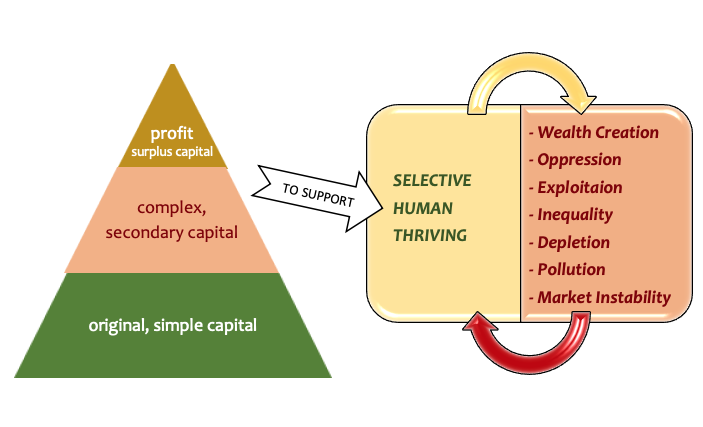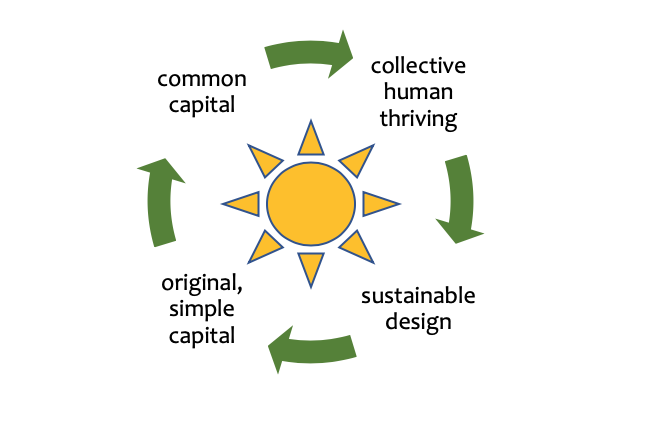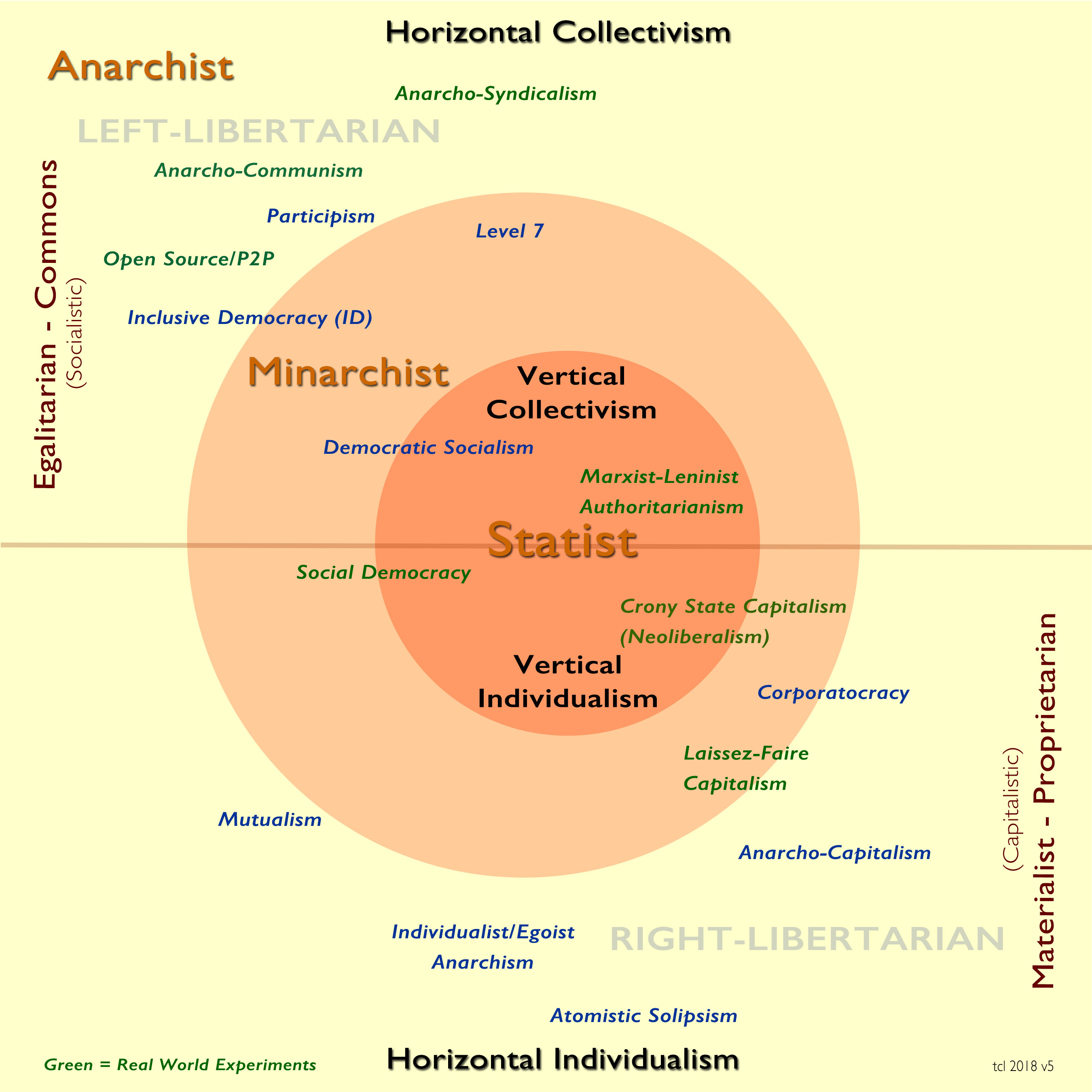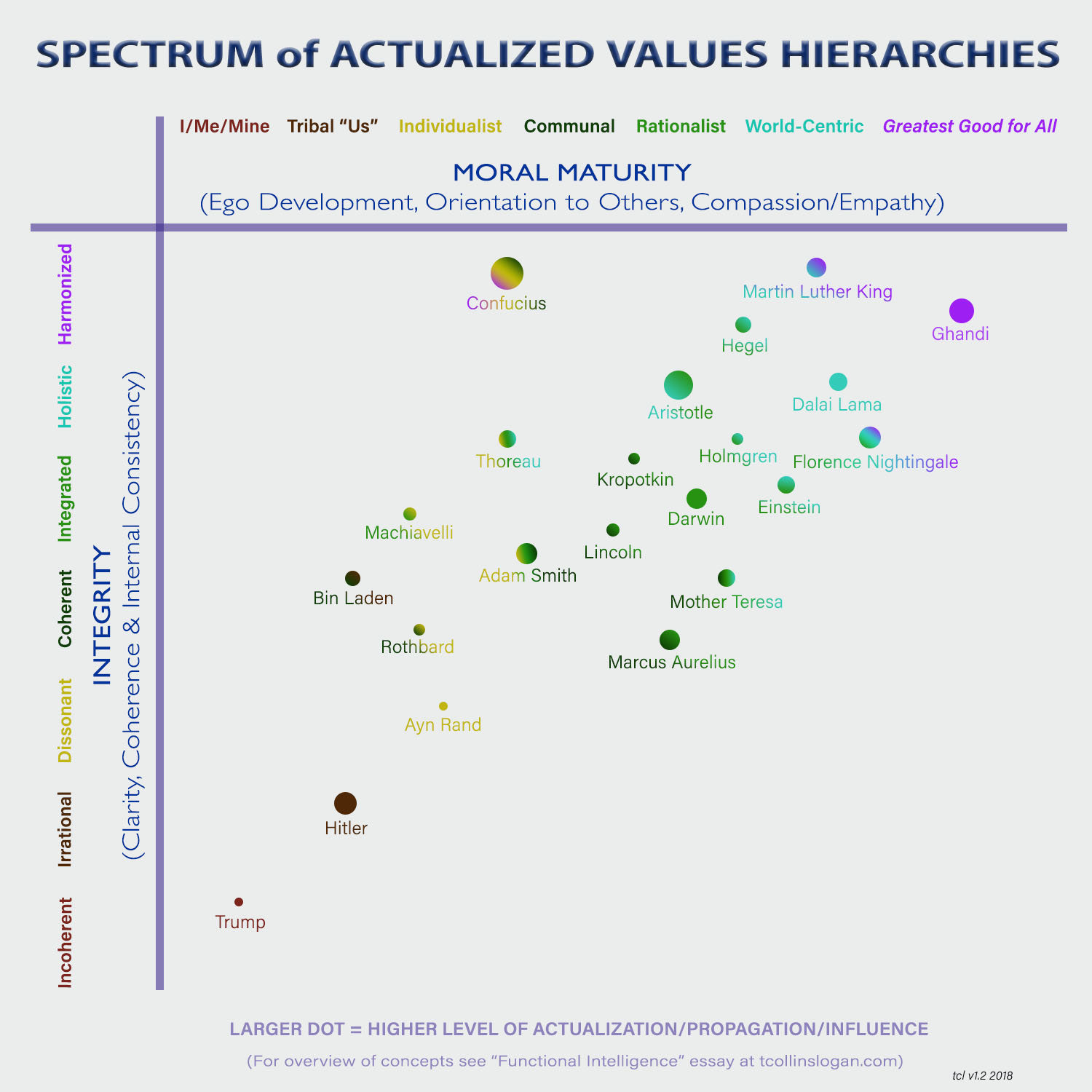
At the prompting of Lincoln Merchant, I have cobbled together my current thinking on a definition of “capitalism.” I am grateful to Lincoln for encouraging me to distill something concise and concrete from an admittedly tangled jumble of assumptions, observations and definitions floating around in my head. Hopefully this quick overview will suffice – though I suspect it still requires refinement.
To begin, I view capitalism as the natural consequence of feudalism and mercantilism, where capitalism maintains similar economic, racial, class and other sociopolitical power structures and stratification found in these systems, but morphs and reworks these components to support larger scales of production, adapts them to larger human populations, takes better advantage of rapidly emerging technologies, creates more diverse opportunities to become an owner-shareholder and concentrate wealth, and encourages (and exploits) a more economically mobile worker-consumer class out of what had been serfs, vassals and slaves. However, for the purposes of this discussion, all of those
morphed components can be conveniently distilled into some form of “capital.” The basic definition of such capital would sound something like this:
Capital is anything that can be shared or accumulated to gain and maintain individual and societal existential security or advantage – that is, to support human thriving.
There are therefore many recognized forms of capital that fulfill this function – many of which mingle and overlap – which have played a role in most cultures throughout human history, and were certainly present in forms of political economy
prior to capitalism. We could call these
original, simple forms of capital:
1.
Social capital: tangible and intangible resources made available through immediate relationships with others – through family ties, geographical communities, institutional and affinity group memberships, social networks, shared class stratum, and spontaneous agreement around values and ideology
2.
Cultural capital: acquired skills, education, style and appearance (racial capital is a subset of cultural capital) – all of which facilitate social mobility and accumulation of social capital
3.
Natural capital: wildly occurring land, plants and animals, water, air, minerals, etc.
4.
Intellectual capital: ideas, knowledge, information, methods, etc.
5.
Creative capital: human labor, inventiveness and ingenuity
6.
Attraction capital: confidence, happiness and satisfaction, cultural “success” signaling, promise of pleasurable outcomes, vitality and charisma
7.
Technological capital: technological advancements of any kind, i.e. “new tools”
8.
Energy capital: the energy available to power any given closed system, the harnessing of which must generally comply with the laws of thermodynamics
9.
Agency capital: natural ability to exercise agency in the world (i.e. to exist, express, affect and adapt – via self-directed volition, in willing concert with others…rather than through coercion, deception and manipulation)
10.
Political capital: social capital and agency capital that have been consolidated into positions of power, privilege and influence
11.
Temporal capital: the passage, measurement, estimation and active apportioningof time as a critical contributive factor to all goals, metrics and processes
12.
Spiritual capital: intrinsic individual and collective spiritual capacities that have transformative influence
Capitalism, as it evolved into its modern form, concerned itself mainly with actively organizing, managing and combining these original, simple forms of capital towards a very specific end:
the production of additional, more complex and abstracted forms of capital that permit every form of capital to be harnessed for the purpose of exchange and accumulation. We could therefore describe these additional forms of capital as
complex, secondary forms, which include:
1.
Private capital: the designation of “private ownership” for as many categories of capital as possible, in order to facilitate exchange and accumulation
2.
Commodified/objectified capital: the creation or designation of tradable “objects” of value from other forms of capital (i.e. services, ideas, goods, etc.)
3.
Productive capital: engineered and accumulated inputs that are focused solely on the production of goods, services, ideas and other commodified capital (this includes circulating capital/intermediate goods; fixed/physical capital, etc.)
4.
Financial capital: a system of money – and currency itself, as a representation of value – that permits accumulations of debt, equity and interest in the course of production and exchange
5.
Competitive capital: a tactical or strategic competitive advantage in production (product differentiation, persuasive marketing, monopolization, engineered scarcity, “noncompetitive” business practices, cronyism, regulatory capture, revolving door politics, etc.)
6.
Entrepreneurial capital: the skills and ability to create enterprise, innovate, adapt and succeed in a competitive marketplace
7.
Global capital: the plutocratic coordination of all political, cultural and economic systems into a global, interdependent conglomerate through which all capital flows can be managed, controlled and directed
Ultimately, these complex, secondary forms of capital have their own singular objective of aggregating and concentrating all capital within the capitalist system
into profit. What is profit? In the simplest terms, it is the ability to extract
value from a system of production and exchange. But what is “profit” for? What aim does it have?
Why does profit exist? Here we come full circle, because aside from hoarding for its own sake, the consequences of generating and accumulating profit are a perceived and actual increase in “individual and societal existential security and advantage” – at least for owner-shareholders. How does profit achieve this? By representing a
distilled, transmutable, extensible and
durable form of surplus capital that arises independently from other capital, and which in turn facilitates ROI and IRR. In other words, profit becomes an abstract but enduring representation of extracted value, a “distilled” representation which itself can be converted into many of other forms of capital (thus “transmutable”), while nevertheless maintaining autonomous facility for its own enlargement (thus “extensible and durable”). It is really quite ingenious…almost magical in its inventiveness. Profit therefore equates a mutually accepted reservoir for transactional power by aggregating, concentrating and superseding all other forms of capital, and then creating value from itself.
At this point we can reflect on how the power structures of feudalism and mercantilism reassert themselves in capitalism. As in feudalism, capitalism tends towards winner-take-all scenarios, where the greatest security and advantage is afforded owner-shareholders (nobles) who can accumulate and secure wealth for their progeny; a small group with exceptional talents, skills, inheritance or luck can increase their economic freedom and mobility (freemen, franklins); and the vast majority of worker-consumers lack any real economic freedom and mobility, and remain as exploited labor (serfs, vassals and slaves) for the owner-shareholders. In order protect and expand these power dynamics, crony capitalism creates a similar relationship between corporations and elected government that merchants had with aristocracy under mercantilism – where workers were oppressed for the benefit of the State, and the State expanded its power through corporate monopolies in international trade. Even where capitalism diverges from these old institutions and relationships, it still maintains similar hierarchies in all of the systems it creates. Perhaps this is why there is such a natural antagonism between democracy and capitalism: the former aims to diffuse power and promote egalitarian distributions and protections (i.e. civil rights and civic institutions) for all classes, while the latter is still aiming to concentrate controls, power and influence for the owner-shareholder class to enlarge their profits. In so many ways, capitalism is really new wine in old wine skins…albeit much more voluminous, complex, and effective wine.
So an approximation of capital’s evolution within capitalism might look like this:

The kernel of truth in ideologies like pro-capitalist market fundamentalism is that there is, in fact, a normal and natural inclination among human beings to increase their own existential security and advantage – their own thriving. However, a disconnect occurs when capitalism is consequently described as an obvious or inevitable outcome of that impulse. There are, after all, many other ways to structure society – and to interact with original, simple capital – so that a greater level of individual and collective security and advantage is facilitated. History is replete with examples that do not include features like private ownership, or prioritizing individual transactions above communal sharing, or emphasizing competitive advantage over collaboration. These include both naturally occurring, self-organized, commons-centric solutions that have endured around the globe (as elaborated in Elinor Ostrom’s common pool resource management research); consciously engineered commons-centric arrangements that have likewise demonstrated success in the real world (such as the societies in Spain, Ukraine and Korea that were modeled on Kropotkin’s anarcho-communism); and experiments that illustrate how
original, simple capital can either remain “shared” as a public good within the commons to varying degrees (direct democracy, Open Source, Creative Commons, P2P, National Parks, public highways, etc.), or can be more sustainably and collectively managed (Transition Towns, worker-owned enterprise, community NGOs, non-profit cooperatives, etc.).
In these alternatives to capitalism, we observe mainly one type of
secondary, complex capital: common capital. There is, however, no longer a need for surplus capital. Common capital designates “common ownership” for as many categories of capital as possible, so they are treated as public goods, available to all for collective benefit. Most of the other forms of secondary, complex capital found in capitalist systems either don’t exist, or are greatly attenuated, deprioritized or transformed. For example, there could still be competitive, entrepreneurial, or financial capital, but they have a more egalitarian, mutually nourishing expression. The consequence of such arrangements is that existential security and advantage – human thriving – is provided for everyone is society, and the old power dynamics and hierarchy of feudalism and mercantilism fade away. In addition, as demonstrated by Ostrom’s research, tragedies of the commons are easily averted, so that the original, simple forms of capital can be preserved. This is the real meaning of “sustainability” in commons-centric systems.
An approximation of the commons model might look like this:

It is important to recognize that, although ingenious in many ways, capitalist activity is entirely invented; there is nothing natural about the process of managing, concentrating and accumulating other forms of capital so they facilitate private property, free enterprise or competitive markets – and there is no reason that all capital must become
transactional in nature, or must result in profits. These are, rather, evidence of a highly inventive species…and perhaps a fairly insecure and immature culture as well. For if all forms of capital can be negotiated purely through transactional relationships, then any need for interpersonal trust, spontaneous reciprocation, or genuine depth of emotional connection can be attenuated or even eliminated. And if, as many researchers suggest,[1] prosociality evolved mainly to facilitate existential security and advantage for tribes, families and individuals,
then there is no longer a strong need for prosociality itself in capitalist societies, since original, simple capital has been pervasively overtaken by complex, secondary forms. The development of these complex, secondary forms understandably disrupts collective valuation of the original, simpler forms – it subjugates them to rigidly hierarchical transactional priorities, and disallows more subtle and dynamic relational priorities. Ideas, friendships, creativity, technological tools, the natural world and so on no longer sustain
intrinsic, facilitative value for individuals and society – certainly not in the context of survival. Instead, the focus of human energies, interactions and agency becomes centered around the secondary forms that assure advantage and security
within a capitalist system. Very much like losing oneself in a video game, or gambling in a casino with no windows or clocks, capitalism creates an ecosystem that is increasingly disconnected from preceding social and ecological systems. Reality becomes externality. And profit, in turn, becomes an end-in-itself, usurping the value of all other forms of capital; and all existential security and advantage is then (philosophically and pragmatically) concentrated into the surplus capital of profit.
The corrosive qualities of capitalism’s secondary forms of capital have of course been intuitively predicted by socialists and anarchists over previous centuries.[2] There are also increasing observations among modern disciplines that outline some of the least attractive psychological and sociological impacts of capitalist systems;[3] that is, what we might call a “casino effect” or “video game effect” on the human psyche. We also have fairly strong evidence that modern capitalism isn’t sustainable, mainly because of snowballing negative externalities that are destroying the original, simple forms of capital.[4] Over the course of being privatized and commodified, natural capital is polluted and depleted; agency capital is abdicated and externalized; social capital becomes isolated, diluted and fragile; political capital is corrupted; spiritual capital is corroded and distorted; cultural capital is homogenized; and so on. So one benefit of appreciating the evolution of capital as outlined here is the potential explanation for why these failures are occurring…and will continue to occur under capitalism. It also suggests how a commons-centric vision can restore more pristine and flourishing versions of original capital and collective thriving. Despite its initial impetus to improve human existential security and advantage – and its spectacular interim success in economic growth and wealth creation – capitalism is now actually undermining and annihilating that security, even as it continues to ensure superficial and temporary advantages for a select few.
There are other characteristics of capitalism that are contributing to its instability and decline, and these can also be described according to dynamics of different forms of capital as we have defined them. As described in Thomas Piketty’s
Capital in the Twenty-First Century, profits that have been increasing regardless of the rate of economic growth are concentrated in the owner-shareholder class, amplifying economic inequality and the potential for societal instability. Piketty argues this concentration is by design, and points to factors like inheritance that perpetuate unequal distribution. Consider, then, that this process is easily understood by examining the different forms of capital, and how they interact both qualitatively and quantitatively. Certain types of capital have hard limits: natural and energy capital are inherently limited and finite. Other types of capital have soft limits: technological, social, and cultural capital, while amplifying other forms of capital, have diminishing impact as scale and complexity increases. Some types of capital are effectively limitless: creative, intellectual, and indeed agency capital can perpetually expand through other forms of capital – especially the secondary, more complex forms – as those forms are aggregated and consolidated. And some capital is both finite and limitless: temporal capital, for instance, which alternately constrains, distills or expands other forms of capital, depending on how it is applied.
Can you see what is happening here? The efficiency by which capitalism concentrates and combines various forms of capital inherently creates tremendous tensions and imbalance between finite categories of capital and infinite categories of capital. And that conflict inevitably results in unsustainability. In the simplest of examples, we cannot produce more orange juice if there is a finite supply of oranges, we cannot convince every consumer they need four additional smartphones, and it becomes more and more challenging to generate private capital if
nearly everything is already privately owned (at least, it becomes decreasingly easy to do so). At the same, we also cannot reliably extract value from creative or intellectual capital when it is ubiquitous and instantly accessible to all, or transfer so much social and agency capital into political capital that it produces fascism (at least not without perilous consequences), or demand that time capital always conform to rigidly constrained expectations where organic variability (in humans and the rest of the natural world) is involved. But as capitalism is growth-dependent and profit-dependent, it insists that resolving these tensions somehow be made
predictable, constant and profitable. Capitalism thus keeps setting one form of capital in opposition to other forms in untenable ways, exciting a self-sabotaging conflict. And while certain innovations, newfound resources, and increased efficiencies have aided capitalism’s eternal quest for more, most of that low-hanging fruit has already been harvested; the expectation of resolving these conflicts – or profiting from them –
has become an asymptotic wager. And, eventually, likely in our not-to-distant future, this wager will effectively arrive at a dead end where progress is indistinguishable from stasis, even as the most destructive externalities of capitalism continue unabated.
Which is why we must return to commons-centric proposals in the hope of restoring sanity to managing and utilizing all forms of capital. The pressure cooker needs to be vented and reduced from boil to a pleasant simmer, so that we have a hope of balancing the finite and the infinite, instead of pitting them against each other. In essence, humanity must humbly awaken to its limitations, and let go of vestigial hierarchical systems. We must stand down, and simplify. And that is what the unitive, egalitarian, ecologically responsible, prosocially restorative elegance of
common capital proposals offer us.
(The most current version of this paper is available at www.tcollinslogan.com/Evolution_of_Capital.pdf)
For further exploration of alternative political economy, please visit www.level-7.org
[1]
http://socialinteractionlab.psych.umn.edu/sites/g/files/pua1356/f/2010/2010/Simpson%20%26%20Beckes%20(Prosocial%20chapter,%202010).pdf,
https://www.sarah-brosnan.com/research/the-evolution-of-prosocial-behavior,
http://www.professormarkvanvugt.com/publications/articles/21-evolution-and-cooperation/125-the-evolutionary-psychology-of-human-prosociality-adaptations,-byproduct,-and-mistakes.html
[2]See Godwin, Paine, Thoreau, Proudhon, Owen, Fourier, Bakunin, Marx, Kropotkin, DuBois, Robinson et al.
[3]
https://www.researchgate.net/scientific-contributions/16246606_Paul_K_Piff,
http://www.tcollinslogan.com/code-3/images/StupefactionOfHumanExperience.pdf
[4]
https://www.weforum.org/agenda/2016/02/does-capitalism-have-to-be-bad-for-the-environment/,
https://www.counterpunch.org/2014/06/04/the-externalities-of-global-warming/,
http://www.level-7.org/Challenges/Capitalism/











